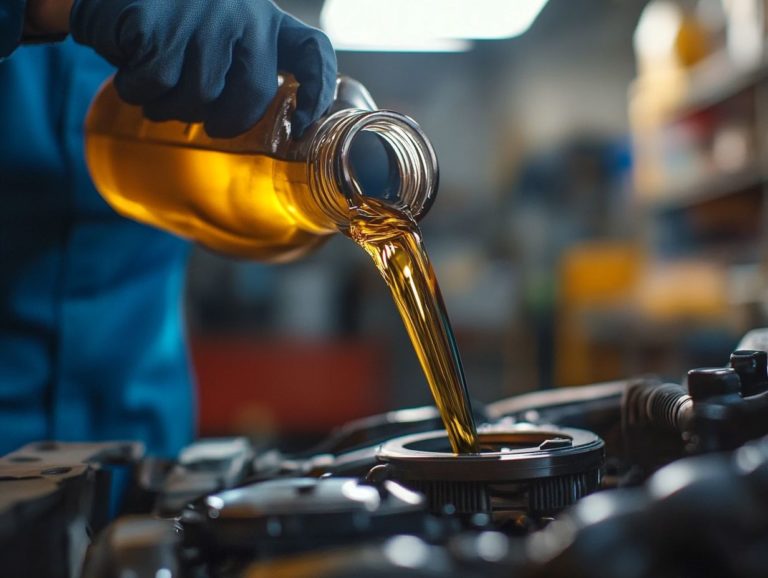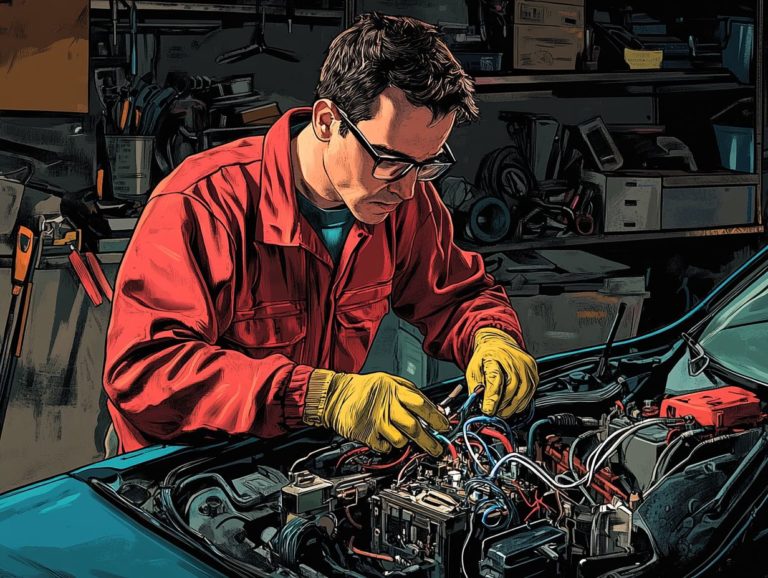What Are the Key Indicators of a Healthy Engine?
Understanding engine health is essential for every vehicle owner. A well-maintained engine not only enhances your car’s performance but also extends its lifespan.
This article delves into the key signs of a healthy engine, highlighting both visual and performance indicators. You ll find insights into common engine problems and their solutions, as well as crucial maintenance tasks and tips to maximize your engine’s longevity.
Act now to keep your engine running strong for years ahead!
Contents
- Key Takeaways:
- Signs of a Healthy Engine
- Performance Indicators
- Common Engine Problems and Solutions
- Identifying and Addressing Issues
- Maintenance and Care for a Healthy Engine
- Regular Inspections and Maintenance Tasks
- Maximizing Engine Lifespan
- Frequently Asked Questions
- What Are the Key Indicators of a Healthy Engine?
- What are the signs of an unhealthy engine?
- How often should I check my engine’s health?
- Can regular maintenance help keep my engine healthy?
- What role does the check engine light play in indicating engine health?
- What specific fluids or components should I regularly check to maintain a healthy engine?
Key Takeaways:

- Your engine should look clean, with no leaks or damage.
- A good engine delivers power and accelerates smoothly, without strange noises.
- Regular maintenance and quick fixes are key to keeping your engine healthy and lasting longer.
Why Engine Health is Important
Engine health is essential for your vehicle’s overall performance and longevity. It directly influences fuel efficiency, maintenance costs, and the likelihood of mechanical breakdowns.
Keeping your engine well-maintained maximizes fuel efficiency and lowers emissions something crucial in today s eco-conscious landscape. Regular maintenance can significantly reduce unexpected repair costs and extend your vehicle’s lifespan, making it a savvy investment for any car owner.
Utilize diagnostic tests to spot minor issues before they escalate. Keep a detailed maintenance history. It helps when selling your car and boosts buyers’ confidence in its reliability.
Signs of a Healthy Engine
Recognizing the signs of a healthy engine is key to maintaining your vehicle’s performance. A well-functioning engine should operate smoothly and optimally, free from any significant warning lights like that dreaded check engine light.
Regularly conducting engine diagnostics allows you to identify issues before they become costly problems, ensuring you stay ahead in vehicle maintenance.
Visual Indicators
Visual indicators are essential for evaluating your engine’s health. Monitor the condition of the engine oil, coolant levels, and signs of smoke or leaks all critical for maintaining peak performance. Checking the color and texture of your engine oil can reveal problems. Clean oil should appear as a translucent amber, while dark, gritty oil is a red flag for possible damage.
Keep an eye on your coolant levels; if they dip too low, you risk overheating and serious mechanical failures. Look for signs of oil pooling beneath your vehicle or a slick film on engine surfaces these indicate leaks that can severely compromise performance.
These visual cues highlight the importance of regular engine inspections, allowing you to intervene early and save on costly repairs that extend your engine’s lifespan.
Don t wait! Schedule your engine inspection today and keep your vehicle in top shape.
Performance Indicators

Performance indicators provide vital insights into how well your engine works. If you notice a drop in fuel efficiency, engine stalling, or strange noises, it could mean there are mechanical problems that require your attention.
By monitoring key performance metrics closely, you can gather essential information about your engine s fuel efficiency. This is crucial for both cost savings and environmental responsibility. For example, observing how your engine performs during acceleration can help identify performance dips, indicating issues like inadequate air-fuel mixtures or problems with fuel injectors.
Engine diagnostics are essential for early detection of these issues. They can prevent significant damage and costly repairs. Regularly tracking these indicators helps maintain optimal performance levels, enhances your driving experience, and extends your engine’s lifespan.
Common Engine Problems and Solutions
Common engine problems can range from minor nuisances to major malfunctions, often requiring the skilled intervention of a professional mechanic. Recognizing symptoms early such as unusual noises or warning lights allows you to prompt timely diagnostic tests.
This proactive approach is vital for pinpointing the root cause and preventing potential mechanical breakdowns.
Identifying and Addressing Issues
Addressing engine issues promptly can significantly enhance your vehicle’s health and performance. Using diagnostic tests allows you to pinpoint mechanical problems accurately and tailor effective solutions.
Tools like OBD-II scanners read error codes, providing insights into various components, from fuel injectors to ignition systems. Familiarize yourself with basic engine inspection tips, such as listening for unusual noises, monitoring fluid levels, and watching for dashboard warning lights. These proactive measures can help you detect potential problems early.
Maintaining a comprehensive service history is crucial. It aids in tracking repairs and enhances your vehicle’s resale value by showcasing your commitment to regular maintenance.
Maintenance and Care for a Healthy Engine
Keep your engine running at its best! Regular maintenance is the key to peak performance and longevity. Diligently tracking your maintenance history and adhering to recommended service intervals like engine servicing and inspections equips you to identify potential issues early on, maintaining optimal performance for the long haul.
Regular Inspections and Maintenance Tasks

Regular inspections and maintenance tasks are essential for preserving your engine’s health and ensuring vehicle safety. Schedule routine engine health checks and auto safety inspections to uncover potential issues before they escalate. Keeping detailed maintenance records for all services performed will be beneficial in the long run.
Incorporating specific tasks like oil changes and tire rotations into your routine can significantly extend your vehicle’s lifespan. These actions not only lubricate critical engine components but also promote even tire wear, enhancing overall handling and fuel efficiency.
By conducting regular inspections, you can catch issues early, preventing costly repairs later on. Maintaining comprehensive records of these services creates a clear history of your vehicle s performance, aiding you in making informed decisions about future repairs or its resale value. A well-documented maintenance schedule instills confidence in potential buyers regarding your vehicle s reliability.
Maximizing Engine Lifespan
Maximizing engine lifespan is crucial for vehicle owners who want to preserve performance and reliability over the long term.
By implementing effective engine care techniques, ensuring proper fuel combustion, and committing to regular maintenance, you can significantly enhance the lifespan of your engine and your vehicle.
Tips for Prolonging the Life of Your Engine
Prolonging your engine’s life requires a proactive approach, which includes regular servicing and maintaining the right amount of coolant.
Adopting effective engine care strategies helps you reduce costly repairs. Keeping a detailed maintenance history is also beneficial.
Prioritizing regular oil changes is essential fresh oil lubricates engine components and prevents wear. Regularly check fluid levels, such as brake and transmission fluids, to ensure your vehicle operates smoothly.
A gentle driving style is equally important. Aggressive acceleration and sudden stops can strain the engine. Know your vehicle’s maintenance history to spot issues early, enhancing the engine’s lifespan and reliability over time.
Frequently Asked Questions
What Are the Key Indicators of a Healthy Engine?

The key indicators of a healthy engine include:
- Good fuel efficiency
- Smooth acceleration
- Consistent power output
- Minimal emissions
- Absence of strange noises or vibrations
What are the signs of an unhealthy engine?
If you notice any of the following signs, your engine may not be healthy:
- A decrease in fuel efficiency
- Rough idling
- Loss of power
- Excessive smoke from the exhaust
- Strange noises coming from the engine
How often should I check my engine’s health?
Make it a habit to check your engine’s health monthly to keep it in peak condition!
Can regular maintenance help keep my engine healthy?
Yes! Regular maintenance, such as oil changes, air filter replacements, and tune-ups, can help keep your engine running smoothly and prolong its lifespan.
What role does the check engine light play in indicating engine health?
The check engine light is an important indicator of potential issues with your engine. If it turns on, don’t wait have your vehicle checked by a mechanic to diagnose and address any problems.
What specific fluids or components should I regularly check to maintain a healthy engine?
Regularly check and maintain levels of:
- Engine oil
- Coolant
- Transmission fluid
Inspect and replace worn or damaged belts and hoses as well.






